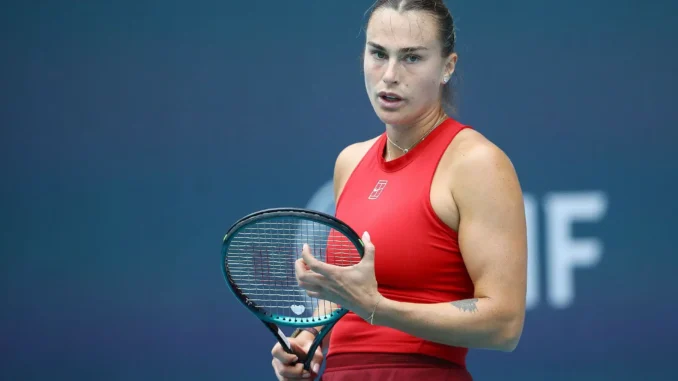
In the sun-drenched stadium of the 2025 Miami Open, where the air crackled with anticipation, a women’s final between Aryna Sabalenka and Jessica Pegula promised a showcase of tennis brilliance. Sabalenka, the world No. 1 and a three-time Grand Slam champion, was on a mission to claim her eighth WTA 1000 title, while Pegula, the American fan favorite ranked No. 4, aimed to seize a rare victory on home soil. The match delivered—a gripping 7-5, 6-2 triumph for Sabalenka, sealed without dropping a set throughout the tournament. Yet, as the Belarusian powerhouse lifted the trophy on March 29, the spotlight veered from her dominance to a sudden eruption of controversy in the stands, where her fans unfurled prohibited Belarusian flags, prompting a swift and dramatic intervention by security.
The Hard Rock Stadium, nestled in the heart of Miami Gardens, buzzed with energy as Sabalenka’s relentless power clashed with Pegula’s tenacity. The first set was a rollercoaster, with seven breaks of serve painting a picture of two warriors trading blows. Sabalenka’s 31 winners overwhelmed Pegula’s 12, her sheer force turning the tide in a second set that slipped from the American’s grasp. Off the court, however, another storyline unfolded. As Sabalenka leveled the opening set at 3-3, a group of front-row spectators leaped to their feet, proudly waving the red-and-green Belarusian flags—a bold display of support for their hero. The moment, fleetingly caught on camera, sparked an immediate reaction. Security guards descended, their urgency palpable, and issued stern warnings to the fans, who quickly complied by tucking the flags away. The brief flare-up didn’t dim their vocal cheers, but it cast a shadow over the celebration.
This wasn’t just a spontaneous burst of patriotism—it was a breach of a deeply rooted policy. Since Russia’s invasion of Ukraine in 2022, with Belarus as a key ally, the tennis world has enforced strict rules. Players from both nations compete as neutrals, stripped of their flags and national emblems on scoreboards and kits. The restriction extends to spectators, a measure born from incidents like the Australian Open’s 2023 ban after similar displays stirred tensions. In Miami, the sight of those flags reignited a debate that’s simmered for years, one that Sabalenka herself has navigated with a mix of resignation and defiance. “I really thought that sport is nothing to do with politics,” she once said, her voice carrying a blend of frustration and acceptance. “But if everyone feels better this way, then it’s okay. I have zero control on it.”
For Sabalenka, the victory was a personal triumph amid a season of highs and lows. The 26-year-old had kicked off 2025 with a title in Brisbane, only to falter in finals at the Australian Open and Indian Wells. Miami was her redemption, a flawless run through a gauntlet of foes—Viktoriya Tomova, Elena-Gabriela Ruse, Zheng Qinwen, Jasmine Paolini, and defending champion Danielle Collins—before toppling Pegula. “Finally I was able to play my best tennis in the final,” she beamed after the match, her relief evident. “I didn’t want to lose another final, to be honest. It’s really tough to lose in the final.” Her win stretched her lead atop the WTA rankings by over 3,000 points, cementing her status as the woman to beat.
Yet, the flag incident underscored the tightrope she walks. A Minsk native who now calls Florida home, Sabalenka has long distanced herself from the conflict tied to her homeland. “I don’t want my country to be in any conflict,” she’s said, her words a plea for peace amid a storm she can’t control. The Miami crowd, split between Pegula’s local support and Sabalenka’s loyalists, bore witness to more than just a match—it was a microcosm of tennis’s uneasy dance with geopolitics. Ukrainian players like Marta Kostyuk and Elina Svitolina have voiced anguish over such displays, pushing for stricter bans, while others argue the sport should remain a neutral haven.
As the dust settled, Sabalenka stood tall, her 19th career title in hand, unfazed by the sidelines drama. The fans, chastened but undeterred, kept their flags hidden but their spirits high, roaring for every point. For them, it was a moment of pride stifled by protocol. For the tennis world, it was another reminder of the fault lines beneath the baseline—a sport striving for unity, yet fractured by forces beyond the players’ reach. Sabalenka, ever the competitor, shifted her gaze forward, already eyeing the clay courts ahead. “I had the mentality to stay there, to fight for every point no matter what,” she said, a mantra that carried her through Miami’s heat—and its headlines.
Leave a Reply